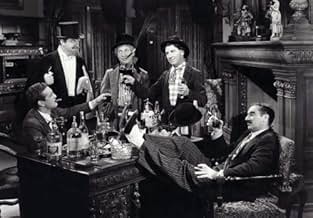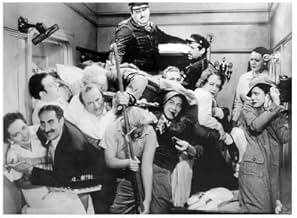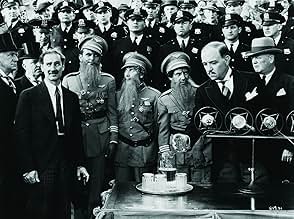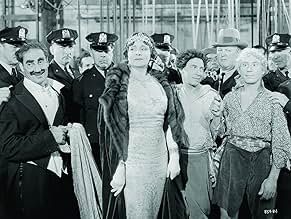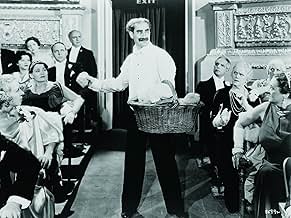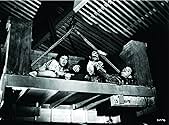IMDb-BEWERTUNG
7,8/10
35.745
IHRE BEWERTUNG
Ein gerissener Geschäftsführer und die beiden schrulligen Freunde von zwei Opernsängern verhelfen diesen zum Erfolg, indem sie deren spießige und versnobte Feinde demütigen.Ein gerissener Geschäftsführer und die beiden schrulligen Freunde von zwei Opernsängern verhelfen diesen zum Erfolg, indem sie deren spießige und versnobte Feinde demütigen.Ein gerissener Geschäftsführer und die beiden schrulligen Freunde von zwei Opernsängern verhelfen diesen zum Erfolg, indem sie deren spießige und versnobte Feinde demütigen.
- Auszeichnungen
- 3 wins total
Walter Woolf King
- Rudolfo Lassparri
- (as Walter King)
Sig Ruman
- Herman Gottlieb
- (as Siegfried Rumann)
Robert Emmett O'Connor
- Police Sergeant Henderson
- (as Robert Emmet O'Connor)
Enrique Acosta
- Nightclub Guest
- (Nicht genannt)
Harry Adams
- Opera Spectator
- (Nicht genannt)
Harry Allen
- Doorman
- (Nicht genannt)
Sam Appel
- Dungeon Guard
- (Nicht genannt)
King Baggot
- Dignitary
- (Nicht genannt)
Marion Bell
- Lady looking for 'Aunt Minnie'
- (Nicht genannt)
Edna Bennett
- Maid
- (Nicht genannt)
Dolly Blackburn
- Little Girl watching Harpo playing
- (Nicht genannt)
Zusammenfassung
Reviewers say 'A Night at the Opera' is celebrated for its iconic comedic routines and the Marx Brothers' unique blend of verbal and physical comedy. Groucho's wit, Chico's musical talents, and Harpo's slapstick humor are highlighted. Margaret Dumont's role and musical numbers add entertainment value, though some criticize their integration. The film is praised for its production quality and subversion of high society norms. However, a perceived shift towards more structured comedy marks the beginning of a decline in their later works.
Empfohlene Bewertungen
Groucho Marx is in his element as slick, fast talking business manager Otis B. Driftwood, who spends his time playing up to arts patron Mrs. Claypool (classic Marx Bros. foil Margaret Dumont). When he sees that she's willing to pony up $1,000 a night to have pompous Lassparri (Walter Woolf King) sing, he wants a piece of the action. Circumstance soon throws him together with equally sly Fiorello (Chico) and goofy Tomasso (Harpo), as they become determined to help out young lovers & aspiring opera stars Rosa (Kitty Carlisle) and Ricardo (Allan Jones).
Even if one is not a fan of the opera, they shouldn't let that dissuade them from checking out the Marx Bros. in their glory. Some buffs consider this their best film, and it certainly shows off their talents to memorable effect. Musical interludes do go on a bit long, but the quality of the comedy when it occurs is top notch. There are some truly great bits in here, like the "party of the first part" contract, the overcrowded (to say the least) stateroom sequence, and the frantic, farcical efforts of Otis, Fiorello, Tomasso, and Ricardo to pull the wool over the eyes of a suspicious inspector (Robert Emmett O'Connor) by moving beds from one room to another.
Groucho is hilarious, as always. Very few entertainers in film history can fire off a one-liner as snappily as he does. Chico and Harpo have their wonderful moments, as well. (It's such a hoot when Harpo does a Spider-Man routine near the end.) Carlisle and Jones are extremely appealing, Dumont is once again a fine "straight woman", King is an appropriately snooty villain, Sig Ruman is superb as eternally frustrated Gottlieb, and O'Connor is likewise good as the antics of Otis and company take a toll on him.
The pace isn't always consistent, but there is some enjoyable action and first rate stunt work. Overall, this is a solid comedy / musical that will appeal to any lover of this era in cinema.
Eight out of 10.
Even if one is not a fan of the opera, they shouldn't let that dissuade them from checking out the Marx Bros. in their glory. Some buffs consider this their best film, and it certainly shows off their talents to memorable effect. Musical interludes do go on a bit long, but the quality of the comedy when it occurs is top notch. There are some truly great bits in here, like the "party of the first part" contract, the overcrowded (to say the least) stateroom sequence, and the frantic, farcical efforts of Otis, Fiorello, Tomasso, and Ricardo to pull the wool over the eyes of a suspicious inspector (Robert Emmett O'Connor) by moving beds from one room to another.
Groucho is hilarious, as always. Very few entertainers in film history can fire off a one-liner as snappily as he does. Chico and Harpo have their wonderful moments, as well. (It's such a hoot when Harpo does a Spider-Man routine near the end.) Carlisle and Jones are extremely appealing, Dumont is once again a fine "straight woman", King is an appropriately snooty villain, Sig Ruman is superb as eternally frustrated Gottlieb, and O'Connor is likewise good as the antics of Otis and company take a toll on him.
The pace isn't always consistent, but there is some enjoyable action and first rate stunt work. Overall, this is a solid comedy / musical that will appeal to any lover of this era in cinema.
Eight out of 10.
Amusing and entertaining Marx picture , it has a lot of funny material and unfortunately intrusive songs . Groucho's wisecracks and the incomparable Chico and Harpo carry the movie . It deals with a sly business manager named Otis B. Driftwood (Groucho Marx) and two (Chico Marx as Fiorello and Harpo Marx as Tomasso) wacky friends of two (Kitty Carlisle as Rosa and Allan Jones as Ricardo) opera singers help them achieve success while humiliating their stuffy and snobbish enemies . Later on , Marx Brothers anarchize the opera , insulting and mocking the guests and players . Their actions include some on stage antics during the stage debut , as they arrange for the normal tenor to be absent so that the young lover named Ricardo can get his chance .
Classic Marx film with many funny sequences , this is the most sustained bit of insanity , full of crazy gags , antics and amusement , being now deemed a satiric masterpiece ,and one of the biggest hits . Although it suffers from staginess and musical comedy plotting but gives the zany threesome plenty of comic elaboration . Enough gags for give several movies , but our favorite is still the cabin scene . Despite the abundant songs and silly as well as sappy love story the movie maintains itself very well . This is a fun comedy as hilariously amusing as the films they made at Paramount with Zeppo . This is a M.G.M production lavishly financed by Irving Thalberg . Excellent Harpo Marx , as usual , he even did many of his own stunts , he later said it was a silly thing for a 47-year-old non-stuntman to have done . Groucho said that this was his favorite among his movies . The Marx Bros (minus Zeppo) are in peak form in this vintage musical comedy with co-star the legendary Margaret Dumont , including sparkling dialogs with Groucho . Furthermore , Sig Ruman makes his first of three appearances in The Marx Brothers films. However , this is the first Marx Brothers film made without brother Zeppo Marx, it started a new trend of The Marx Brothers movies featuring a Zeppo-like supporting character who carries the love story and sings the song . The motion picture was well directed by Sam Wood . Sam Wood, freshman The Marx Brothers director in this film, was a perfectionist , the scene in which Harpo Marx hangs from the rope was filmed so many times that Harpo Marx's hands became cut and swollen from the rope . Don't miss it , one of the funniest picture ever made by Marx Brothers
Other important films starred by Marx Brothers -many of them Broadway farce plays transfered by scenarists into vehicle for the Brothres- , they are the followings : ¨Animal crackers¨, ¨Duck soap¨ that was a flop when first released but today considered a masterpiece , ¨Horse Feathers¨, ¨At the circus¨, ¨Day at the races¨ , ¨Room service¨ , ¨Go West¨, ¨Love Happy¨ and ¨Night in Casablanca¨, though in 1946 the Marx formula was wearing thin . Any film with Groucho , Chico , Harpo and Zeppo is well worth seeing .
Classic Marx film with many funny sequences , this is the most sustained bit of insanity , full of crazy gags , antics and amusement , being now deemed a satiric masterpiece ,and one of the biggest hits . Although it suffers from staginess and musical comedy plotting but gives the zany threesome plenty of comic elaboration . Enough gags for give several movies , but our favorite is still the cabin scene . Despite the abundant songs and silly as well as sappy love story the movie maintains itself very well . This is a fun comedy as hilariously amusing as the films they made at Paramount with Zeppo . This is a M.G.M production lavishly financed by Irving Thalberg . Excellent Harpo Marx , as usual , he even did many of his own stunts , he later said it was a silly thing for a 47-year-old non-stuntman to have done . Groucho said that this was his favorite among his movies . The Marx Bros (minus Zeppo) are in peak form in this vintage musical comedy with co-star the legendary Margaret Dumont , including sparkling dialogs with Groucho . Furthermore , Sig Ruman makes his first of three appearances in The Marx Brothers films. However , this is the first Marx Brothers film made without brother Zeppo Marx, it started a new trend of The Marx Brothers movies featuring a Zeppo-like supporting character who carries the love story and sings the song . The motion picture was well directed by Sam Wood . Sam Wood, freshman The Marx Brothers director in this film, was a perfectionist , the scene in which Harpo Marx hangs from the rope was filmed so many times that Harpo Marx's hands became cut and swollen from the rope . Don't miss it , one of the funniest picture ever made by Marx Brothers
Other important films starred by Marx Brothers -many of them Broadway farce plays transfered by scenarists into vehicle for the Brothres- , they are the followings : ¨Animal crackers¨, ¨Duck soap¨ that was a flop when first released but today considered a masterpiece , ¨Horse Feathers¨, ¨At the circus¨, ¨Day at the races¨ , ¨Room service¨ , ¨Go West¨, ¨Love Happy¨ and ¨Night in Casablanca¨, though in 1946 the Marx formula was wearing thin . Any film with Groucho , Chico , Harpo and Zeppo is well worth seeing .
I must admit that I am very light in personal knowledge of MArx Brothers films,and aside from the general information,imagery and quotes(the majority of which came from the irrepressible Groucho)that have been used and attributed in Western culture over the last seventy or eighty odd years,I have a very scant referential knowledge of their legendary body of film work.
With that in mind,when I saw the public library had a copy of this film in its stacks,it was a no-brainer for me. And it was a largely pleasing film experience as well.
The storyline seems to be somewhat insignificant: Brothers MArx are scattered about the goings on at a Venetian Opera company as it moves from Europe to New York City. They conspire to break a humble but talented tenor into the main role of the traveling show,as he is mooning over the young ingénue(Kitty Carlisle Hart,WELL before becoming the grand dame of TV Panel game shows!). But aside from the fair amount of music(hey,this IS,after all set in an Opera,so it goes to reason),this is mostly a physical comedy,laced with plenty of Groucho's standard one-liners. From watching his dealings with various straight people,from old stand-by MArgaret Dumont as his society-climbing wife,to the various lugs who signify authority(Theater directors,producers,society bigwigs,ship crew,policemen,local magistrates,etc.),Groucho is not only able to keep the humor legendarily fast and loose but also keeps the tempo of the dialog from bogging(I even noticed a sort of inspiration the creators at WArner Brothers got for Bugs Bunny from Groucho's witticisms!).
Maybe not the best of the Marxes films--though I still don't have a real gauge of opinion on this yet--but it's a fantastic starter film to build familiarity.
With that in mind,when I saw the public library had a copy of this film in its stacks,it was a no-brainer for me. And it was a largely pleasing film experience as well.
The storyline seems to be somewhat insignificant: Brothers MArx are scattered about the goings on at a Venetian Opera company as it moves from Europe to New York City. They conspire to break a humble but talented tenor into the main role of the traveling show,as he is mooning over the young ingénue(Kitty Carlisle Hart,WELL before becoming the grand dame of TV Panel game shows!). But aside from the fair amount of music(hey,this IS,after all set in an Opera,so it goes to reason),this is mostly a physical comedy,laced with plenty of Groucho's standard one-liners. From watching his dealings with various straight people,from old stand-by MArgaret Dumont as his society-climbing wife,to the various lugs who signify authority(Theater directors,producers,society bigwigs,ship crew,policemen,local magistrates,etc.),Groucho is not only able to keep the humor legendarily fast and loose but also keeps the tempo of the dialog from bogging(I even noticed a sort of inspiration the creators at WArner Brothers got for Bugs Bunny from Groucho's witticisms!).
Maybe not the best of the Marxes films--though I still don't have a real gauge of opinion on this yet--but it's a fantastic starter film to build familiarity.
Though some claim that either HORSE FEATHERS OR DUCK SOUP was the greatest Marx Brothers opus, A NIGHT AT THE OPERA has to be Marxdom's signature film. The witticisms and riotous madcap from playwright George Kaufman (THE MAN WHO CAME TO DINNER; YOU CAN'T TAKE IT WITH YOU) is evident everywhere in the some of the team's finest composition of wit and physical comedy.
After taking over MGM studios in the 1930's, big-wig Irving Thallberg pulled the Marx Bros. aside and told them, "You know, you guys are missing only one thing in your pictures: you never help anybody." After OPERA, the Marx Brothers' scripts always revolved around either an attempt to get a romantic couple together or became an effort to save an institution from going under, i.e., THE BIG STORE; A DAY AT THE RACES; HORSE FEATHERS; THE BIG CIRCUS.
Margaret Dumont is established once and for all as Groucho's perfect romantic staple and a Marx Bros. movie just doesn't seem right without her. Sig Rumond appears to have been created in a Marx Brothers comedy factory and serves sensationally as the urbane Marx antagonist vying for Dumont's favors, though upended time and time again by Groucho. A young Kitty Carlisle and Allen Jones provide the romance and music--though many audiences never realize how fine an operatic voice Carlisle had in those days.
So many hilarious and classic routines fill A NIGHT AT THE OPERA that the movie offers itself as a study in Komedy 101: the unforgettable "contract" bit between Chico and Groucho (Chico can't read). As they try to sign an agreement about the rights to manage singer Allen Jones, they tear clause after clause off the paper until Chico finally asks: "What's this?" "Oh," replies Groucho, "that's just a sanity clause." Chico bursts out laughing. "Oh, you canna' fool me; there ain't' no sanity Klaus!..." The crowded state room scene where Groucho, Chico, and Hapro stow-away in a tiny cubicle and the shoebox crams with more and more people until Mrs. Claypool (Dumont) opens the door and everyone spills out...The hotel scene where Detective Henderson tries to nail the brothers for stowing-away and everyone races back and forth between suites, furniture is switched, and Henderson is left wondering if he's nuts...
But it is the film's finale during a live performance at the New York opera house that is perhaps the comedy team's grandest movie climax. The police, still after Harpo for stowing away, try to arrest him during a live performance. He breaks through the theater's backstage, swings over the proscenium like a trapeze artist, and, at one point, tears off the dress of one of the singers. "Well, now we're finally getting somewhere!" Groucho opines from the audience.
What a shame A NIGHT AT THE OPERA is not on television more often. Young people should be treated to comedy as it once was when laughter depended upon uproarious wit and a brand of physical comedy perfected by comedians through years of refining their craft in vaudeville.
A NIGHT AT THE OPERA is nothing less than an American comedy classic.
Trivia: Maragaret Dumont appeared with Groucho on THE Hollywood PALACE television show in 1965 and the couple did a brief repartee from GROUCHO's famous Captain Spaulding routine. The next day Dumont passed away...Her last film was in 1964 in the star-studded WHAT A WAY TO GO...Always playing a haughty spinstress with money, Dumont was, in fact, a millionairess in real life and commuted between Hollywood and London....Few realize what a fine operatic singer Kitty Carlisle was in the 1930's. In the 1950's and '60's she was a regular panelist on television quiz shows such as I'VE GOT A SECRET...She was also married to playwright Moss Hart who collaborated with George Kaufman on YOU CAN'T TAKE IT WITH YOU, THE MAN WHO CAME TO DINNER, and many other plays. YOU CAN'T won the Pulitzer Prize...Allen Jones was the father of popular singer Jack Jones...Groucho said that it was while hanging out of an airplane in A NIGHT IN CASABLANCA (1946) that he finally realized the brothers had pretty much reached the end of the line in movies...The last picture in which all three brothers appeared was THE STORY OF MANKIND in 1957. Groucho played the part of Sir Isaac Newton...Groucho wrote many books: MEMOIRS OF A MANGY LOVER and LETTERS FROM GROUCHO...Harpo Marx also wrote his own autobiography: HARPO SPEAKS--a fine expose of the brothers' early years and the many stage shows they did perfecting their mayhem...When the stock market crashed in 1929, Groucho lost every dime he had: about $250,000...In the 1950's Groucho hosted his own television quiz show,YOU BET YOUR LIFE and both Harpo and Chico made surprise appearances...Chico was a lifetime gambler and would bet on anything...MINNIE'S BOYS, a stage play about the influence of Marx mother Minnie, was pretty much a flop in the 1970's...One of the all-time great quotations about the Marx Brothers came from playwright George Kaufman who, after watching the comedy team tear apart his script on stage in the early years, observed: "I could have sworn I just heard one of the original lines from the play."...Groucho was self-conscious about his lack of formal education and once had the chance to meet poet T.S. Eliot. He read many of Eliot's works and boned up on literature. When the two men did finally meet, all Eliot wanted to talk about was A NIGHT AT THE OPERA...One of Groucho's final performances just before he died was at Carnegie Hall in New York and it was a smashing success. He was accompanied by pianist Marvin Hamlisch...Film critic James Agee once said that the worst thing the Marx Brothers ever did was still better than everybody else...
Dennis Caracciolo
After taking over MGM studios in the 1930's, big-wig Irving Thallberg pulled the Marx Bros. aside and told them, "You know, you guys are missing only one thing in your pictures: you never help anybody." After OPERA, the Marx Brothers' scripts always revolved around either an attempt to get a romantic couple together or became an effort to save an institution from going under, i.e., THE BIG STORE; A DAY AT THE RACES; HORSE FEATHERS; THE BIG CIRCUS.
Margaret Dumont is established once and for all as Groucho's perfect romantic staple and a Marx Bros. movie just doesn't seem right without her. Sig Rumond appears to have been created in a Marx Brothers comedy factory and serves sensationally as the urbane Marx antagonist vying for Dumont's favors, though upended time and time again by Groucho. A young Kitty Carlisle and Allen Jones provide the romance and music--though many audiences never realize how fine an operatic voice Carlisle had in those days.
So many hilarious and classic routines fill A NIGHT AT THE OPERA that the movie offers itself as a study in Komedy 101: the unforgettable "contract" bit between Chico and Groucho (Chico can't read). As they try to sign an agreement about the rights to manage singer Allen Jones, they tear clause after clause off the paper until Chico finally asks: "What's this?" "Oh," replies Groucho, "that's just a sanity clause." Chico bursts out laughing. "Oh, you canna' fool me; there ain't' no sanity Klaus!..." The crowded state room scene where Groucho, Chico, and Hapro stow-away in a tiny cubicle and the shoebox crams with more and more people until Mrs. Claypool (Dumont) opens the door and everyone spills out...The hotel scene where Detective Henderson tries to nail the brothers for stowing-away and everyone races back and forth between suites, furniture is switched, and Henderson is left wondering if he's nuts...
But it is the film's finale during a live performance at the New York opera house that is perhaps the comedy team's grandest movie climax. The police, still after Harpo for stowing away, try to arrest him during a live performance. He breaks through the theater's backstage, swings over the proscenium like a trapeze artist, and, at one point, tears off the dress of one of the singers. "Well, now we're finally getting somewhere!" Groucho opines from the audience.
What a shame A NIGHT AT THE OPERA is not on television more often. Young people should be treated to comedy as it once was when laughter depended upon uproarious wit and a brand of physical comedy perfected by comedians through years of refining their craft in vaudeville.
A NIGHT AT THE OPERA is nothing less than an American comedy classic.
Trivia: Maragaret Dumont appeared with Groucho on THE Hollywood PALACE television show in 1965 and the couple did a brief repartee from GROUCHO's famous Captain Spaulding routine. The next day Dumont passed away...Her last film was in 1964 in the star-studded WHAT A WAY TO GO...Always playing a haughty spinstress with money, Dumont was, in fact, a millionairess in real life and commuted between Hollywood and London....Few realize what a fine operatic singer Kitty Carlisle was in the 1930's. In the 1950's and '60's she was a regular panelist on television quiz shows such as I'VE GOT A SECRET...She was also married to playwright Moss Hart who collaborated with George Kaufman on YOU CAN'T TAKE IT WITH YOU, THE MAN WHO CAME TO DINNER, and many other plays. YOU CAN'T won the Pulitzer Prize...Allen Jones was the father of popular singer Jack Jones...Groucho said that it was while hanging out of an airplane in A NIGHT IN CASABLANCA (1946) that he finally realized the brothers had pretty much reached the end of the line in movies...The last picture in which all three brothers appeared was THE STORY OF MANKIND in 1957. Groucho played the part of Sir Isaac Newton...Groucho wrote many books: MEMOIRS OF A MANGY LOVER and LETTERS FROM GROUCHO...Harpo Marx also wrote his own autobiography: HARPO SPEAKS--a fine expose of the brothers' early years and the many stage shows they did perfecting their mayhem...When the stock market crashed in 1929, Groucho lost every dime he had: about $250,000...In the 1950's Groucho hosted his own television quiz show,YOU BET YOUR LIFE and both Harpo and Chico made surprise appearances...Chico was a lifetime gambler and would bet on anything...MINNIE'S BOYS, a stage play about the influence of Marx mother Minnie, was pretty much a flop in the 1970's...One of the all-time great quotations about the Marx Brothers came from playwright George Kaufman who, after watching the comedy team tear apart his script on stage in the early years, observed: "I could have sworn I just heard one of the original lines from the play."...Groucho was self-conscious about his lack of formal education and once had the chance to meet poet T.S. Eliot. He read many of Eliot's works and boned up on literature. When the two men did finally meet, all Eliot wanted to talk about was A NIGHT AT THE OPERA...One of Groucho's final performances just before he died was at Carnegie Hall in New York and it was a smashing success. He was accompanied by pianist Marvin Hamlisch...Film critic James Agee once said that the worst thing the Marx Brothers ever did was still better than everybody else...
Dennis Caracciolo
"A Night at the Opera" is great Marx Brothers entertainment. It has comedy, music, and a good cast - everything except Zeppo, who by this time had left the act. It fully deserves its reputation as one of the two best Marx Brothers films, along with "Duck Soup".
"A Night at the Opera" is probably slightly less funny than "Duck Soup" (it is no criticism to say that of any film), but it has more of a story to connect the great comic bits. There is a good supporting cast in both films - here Sig Ruman is especially funny, in addition to the perennial Margaret Dumont. It also has several fairly long musical interludes - some are operatic, but the most entertaining is Chico and Harpo's impromptu shipboard entertainment.
Of course, the real attraction in any of these films is the comedy, and there are some memorable bits in this one. The contract negotiations between Chico and Groucho, and the scene in Groucho's stateroom, are especially hilarious, and you have to see the stateroom scene more than once to catch everything. And for sustained zany humor, the climactic sequence at the opera might be the funniest part of all.
This is certainly a must for Marx Brothers fans.
"A Night at the Opera" is probably slightly less funny than "Duck Soup" (it is no criticism to say that of any film), but it has more of a story to connect the great comic bits. There is a good supporting cast in both films - here Sig Ruman is especially funny, in addition to the perennial Margaret Dumont. It also has several fairly long musical interludes - some are operatic, but the most entertaining is Chico and Harpo's impromptu shipboard entertainment.
Of course, the real attraction in any of these films is the comedy, and there are some memorable bits in this one. The contract negotiations between Chico and Groucho, and the scene in Groucho's stateroom, are especially hilarious, and you have to see the stateroom scene more than once to catch everything. And for sustained zany humor, the climactic sequence at the opera might be the funniest part of all.
This is certainly a must for Marx Brothers fans.
Wusstest du schon
- WissenswertesIn exasperation after several attempts to have Groucho Marx read one of his lines in the manner director Sam Wood had requested, Wood exclaimed, "I guess you just can't make an actor out of clay." Groucho Marx instantly responded, "Nor a director out of Wood."
- PatzerRicardo is clearly standing on the dock as the ship pulls away, yet he turns up on board later as a stowaway.
- Zitate
Otis B. Driftwood: It's all right, that's in every contract. That's what they call a sanity clause.
[Fiorello laughs loudly]
Fiorello: You can't fool me! There ain't no Sanity Claus!
- Alternative VersionenAll references to the first portion of the film taking place in Italy were edited from the original negative sometime after the original release. There is speculation that this was done during WWII when Italy was as Axis power, but it also may have been done in the late 1930's to appease Mussolini, who didn't like the way Italians were being portrayed. Either way, the film's first scene begins rather abruptly and is missing a musical number and references to Milan, Italy.
- VerbindungenEdited into Apaga y vámonos: Folge #1.5 (2013)
- SoundtracksIl Trovatore: Di quella pira
(1853) (uncredited)
Music by Giuseppe Verdi
Libretto by Leone Emanuele Bardare and Salvatore Cammarano
Sung by Walter Woolf King
with The MGM Symphony Orchestra
Top-Auswahl
Melde dich zum Bewerten an und greife auf die Watchlist für personalisierte Empfehlungen zu.
Details
- Erscheinungsdatum
- Herkunftsland
- Sprachen
- Auch bekannt als
- A Night at the Opera
- Drehorte
- Produktionsfirma
- Weitere beteiligte Unternehmen bei IMDbPro anzeigen
Box Office
- Weltweiter Bruttoertrag
- 8.200 $
- Laufzeit1 Stunde 36 Minuten
- Farbe
- Seitenverhältnis
- 1.37 : 1
Zu dieser Seite beitragen
Bearbeitung vorschlagen oder fehlenden Inhalt hinzufügen

Oberste Lücke
By what name was Skandal in der Oper (1935) officially released in India in English?
Antwort


